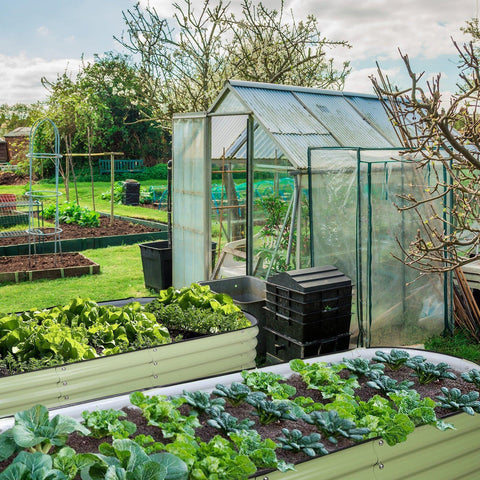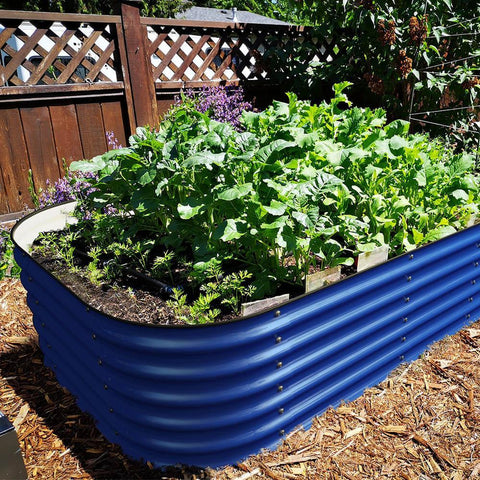Knowledge from Olle Garden Bed:How to Increase Potato Yield with Epsom Salt
Looking to boost your potato yield? Discover the secret weapon: Epsom salt! Learn how to use it to enhance your potato harvest! Read here are some things that you should know when It comes to Olle Garden Beds!
Potatoes are a staple crop in many regions worldwide, and gardeners have been searching for methods to improve their yield and quality. Epsom salt, also known as magnesium sulfate, is a popular garden supplement believed to enhance plant health, increase yield, and improve nutrient uptake.
However, before you start pouring Epsom salt on your potatoes, it's crucial to understand the science behind this supplement and how to use it safely and effectively.

Why do potatoes need magnesium?
Magnesium is an essential mineral for plant growth and development, playing a vital role in photosynthesis, enzyme activation, and protein synthesis.
Potatoes are particularly sensitive to magnesium deficiency, which can lead to various symptoms such as yellowing leaves, stunted growth, and poorly developed tubers. There are two main reasons for magnesium deficiency in plants.
The first is a lack of magnesium in the soil, which can occur in light, sandy, or acidic soils that have been heavily leached by rainfall or irrigation. The second reason is magnesium deficiency caused by mineral imbalances in the soil or the plant.
For example, high levels of soil potassium can interfere with the uptake of magnesium by the roots, even if there is sufficient magnesium in the soil. Ideally, potato plants require ³⁄₁₀ to ¹¹⁄₂₀% magnesium after the fourth leaf emerges from the tip.
How does Epsom salt help potatoes?
Epsom salt is a readily available source of magnesium and sulfur, which can help correct magnesium deficiency in plants. Sulfur is another essential nutrient for plant growth, playing a crucial role in protein synthesis, chlorophyll formation, and disease resistance.
When applied to the soil or the plant, Epsom salt can help improve nutrient uptake, promote plant growth, increase yield, and enhance quality. It can also aid in improving soil structure and nutrient retention, making it a valuable supplement for healthy plant growth.
How to use Epsom salt for potatoes
While Epsom salt can provide multiple benefits to plants, here are some tips to help you make the most of it for your potatoes:
Step 1: Test your soil
Before applying Epsom salt to your potato crop, it's essential to test the soil's magnesium content. This will help you determine if your plants are deficient in magnesium and how much Epsom salt you need to apply.
You can perform a DIY soil test, purchase a soil testing kit, or send soil samples to a laboratory for analysis. Keep in mind that if you choose to send soil samples to a professional lab, it may take one to two weeks to receive the results.
Step 2: Use Epsom salt sparingly
Epsom salt is a concentrated source of magnesium and sulfur, so it's crucial to use it with caution to avoid over-fertilizing your potatoes. For most potato varieties, a single application of Epsom salt during the growing season (spring) should suffice.
To apply Epsom salt to your potatoes, mix 1 tablespoon of Epsom salt with 1 gallon of water. You can use this solution to water the roots or spray the leaves, but avoid applying the solution to potato leaves in hot, sunny weather.
Step 3: Use compost as a long-term solution
While Epsom salt can quickly address magnesium deficiency in potato plants, it's not a long-term solution. To maintain healthy soil and plants, you should regularly add organic matter, such as compost, to the soil.
Compost contains a range of essential nutrients, including magnesium, which helps improve soil structure, water retention, and nutrient availability.
Although magnesium is a vital nutrient for potato plants, it is not the only nutrient they require. Potatoes need a range of other nutrients, such as nitrogen, phosphorus, and potassium, for normal growth and development.
Before applying Epsom salt or any other supplement to your crops, conduct a soil test to determine if your soil needs additional nutrient supplementation.
Epsom salt dosage for potatoes
The amount of Epsom salt you should apply to your potato crop depends on several factors, such as soil magnesium content, potato variety, and growing conditions. However, as a general rule, 1 tablespoon of Epsom salt per gallon of water is a safe and effective dosage for most potato varieties.
You can apply the Epsom salt to your potatoes using a watering can or a sprayer. If applying to the leaves, avoid doing so in hot, sunny weather to prevent scorching or burning of the leaves.
Risks and precautions
While Epsom salt can provide multiple benefits to potato plants, it must be used safely and with precautions to avoid over-fertilization or damage to the crops. Here are some risks and precautions to keep in mind:
Epsom salt may be toxic to certain plants such as legumes, blueberries, and fig leaves, and should only be applied to plants known to benefit from magnesium and sulfur supplements. Besides potatoes, other plants that can benefit from Epsom salt include lettuce, zucchini, and tomatoes.
Over-fertilization with Epsom salt can lead to nutrient imbalances, soil pollution, and environmental contamination.
Epsom salt should not be used as a substitute for proper soil management or nutrient supplementation.
Epsom salt can be harmful if ingested by pets, so store it in a safe location inaccessible to animals and children.
Alternatives to Epsom salt
While Epsom salt can quickly address magnesium deficiency in potato plants, there are several alternative supplements and management practices that can help maintain healthy soil and plants. Here are some options to consider:
Compost: Regularly adding compost to the soil can provide a range of essential nutrients, including magnesium, and help improve soil structure, water retention, and nutrient availability.
Mulching: Adding organic mulch, such as straw or leaves, around potato plants can help retain soil moisture, prevent weed growth, and provide a slow-release source of nutrients as the mulch decomposes.
Fertilizers: Balanced fertilizers containing all essential nutrients (such as nitrogen, phosphorus, and potassium) can help maintain healthy soil and plants.

Epsom-lutely Spud-tacular!
Epsom salt can provide multiple benefits to potato plants, but it must be used safely and cautiously, combined with other management practices, to maintain healthy soil and plants.
By testing the soil, applying Epsom salt sparingly, using compost as a long-term solution, and considering other nutrient requirements, you can help increase potato yield and quality. As with any garden supplement, reading labels, following instructions carefully, and taking precautions to avoid over-fertilization or crop damage are crucial.
Note: The phrase "Epsom-lutely Spud-tacular" is a play on words, combining "Epsom" (referring to Epsom salt) and "absolutely spectacular" to highlight the potential positive impact of using Epsom salt for potatoes.
